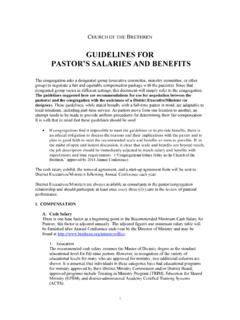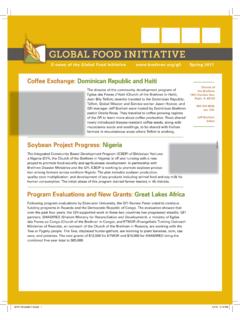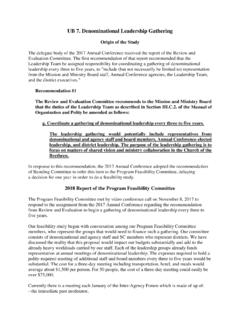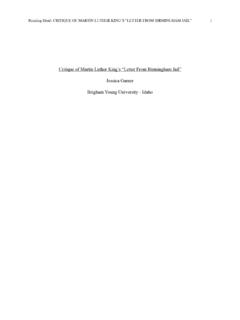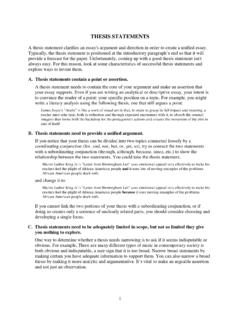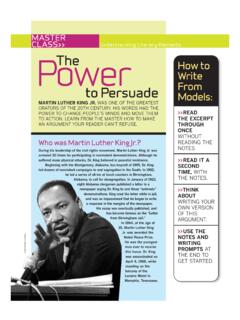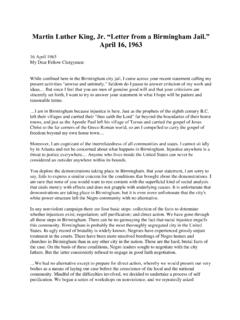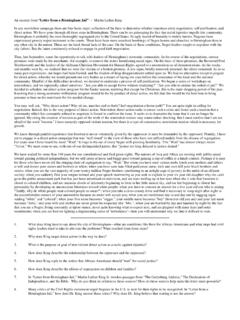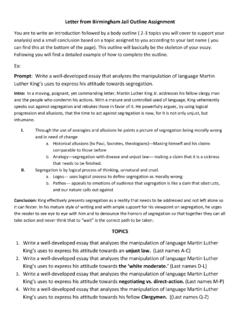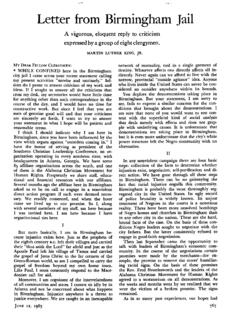Transcription of A Response to Response to Dr. Martin Luther King Jr.’s ...
1 Response to Dr. Martin Luther King Jr. s letter from birmingham JailA Response to Dr. Martin Luther King Jr. s letter from birmingham jail April 16, 2013By Christian Churches Together in the in 2006, Christian Churches Together in the is a fellowship of 36 national communions, including African American, Catholic, Evangelical/Pentecostal, Historic Protestant, and Orthodox; and seven national organiza-tions, including American Bible Society, Bread for the World, Evangelicals for Social Action, Habitat for Humanity, National Hispanic Christian Leadership Conference, Sojourners, and World Vision. National leaders of the participant churches and organizations meet annually for mutual support, to fos-ter Christian unity, to foster evangelism, and to speak to society with a common voice whenever possible.
2 For more information, visit 3 Response to Dr. Martin Luther King Jr. s letter from birmingham JailChristian Churches Togetherin the of ConTenTSWe Are Grateful ..5We Are Challenged ..5 To realize our essential interdependence To address the causes of injustice, not just symptoms To recognize that the struggle is not only economic and political, but personal To seek a higher standard for public policy and political participation To be extremists for love, justice, and peace in Christ To act now To engage in nonviolent direct action as a strategy for social transformation To challenge injustice by bringing it into the light To cherish the church, while holding it to a higher standard To hold fast to the true foundation of the American dreamWe Reflect ..12We Confess ..13We Thank.
3 14We Resolve ..14 Appendix ..17 4 Dear brothers and sisters in Christ and all Americans,As leaders of Christian Churches Together (CCT) in the , we have been challenged anew by the let-ter Dr. Martin Luther King Jr. wrote 50 years ago to another group of religious leaders while sitting in jail . The letter from birmingham jail was written as a Response to an open letter to Dr. King that appeared in a local newspaper, from eight white clergymen of the state (including bishops, pastors, and a rabbi). They urged an end to the demonstra-tions and civil disobedience that were occurring in the city and commended the use, instead, of patient negotiation and legal action to address any perceived denial of rights to black citizens. Rather than simply dismissing the concerns raised in the letter from the clergymen, or responding with anger, Dr.
4 King addressed them as Fellow Clergymen and as broth-ers. He wrote, since I feel you are men of genuine good will and that your criticisms are sincerely set forth, I want to try to answer your statement in what I hope will be patient and reasonable terms. 1 He addressed each of their statements, inferences, and assumptions, and also laid out his own dis-appointments with and vision for the church as an agent of God s justice and peace. This letter was rapidly picked up by media around the world and was immediately recog-nized as a document of historic significance. letter from birmingham jail has stood since as a landmark in the litera-ture of social justice, exhibiting the same spirit as that of the great prophet Micah: What does the Lord require of you but to do justice, and to love kindness, and to walk humbly with your God?
5 (Micah 6:8). Since the open letter that compelled Dr. King to respond came from religious leaders of Alabama in 1963, as church leaders of the 21st century representing an array of religious traditions, we now feel compelled to respond to Dr. King s letter from birmingham jail . 1 letter from birmingham jail , Liberation Curriculum, Martin Luther King Jr. Papers Project, P. 1. Page number references in the footnotes are to this source, unless otherwise indicated. Christian Churches Together in the 5 Response to Dr. Martin Luther King Jr. s letter from birmingham JailChristian Churches Togetherin the Injustice anywhere is a threat to justice every-where. We are caught in an inescap-able network of mutuality, tied in a sin-gle garment of destiny. Whatever affects one directly, affects all indirectly.
6 We Are GratefulWe express profound gratitude to the leaders of the civil rights movement whose sacrifices have moved us closer to God s justice. Those leaders and thousands who followed their lead accomplished more than many could imagine and demon-strated the power of Christian, nonviolent action. We celebrate the remarkable strides made through their courageous Are ChallengedWe are deeply moved by the key themes of Dr. King s let-ter and lift them up anew that they may again challenge our churches and our nation:To ReALize oUR eSSenTiAL inTeRDepenDenCe. Injustice anywhere is a threat to justice everywhere. We are caught in an inescapable network of mutuality, tied in a sin-gle garment of destiny. Whatever affects one directly, affects all indirectly. 1As American society becomes increasingly multicultural and globalized, our interdependence becomes both more evident and more complex.
7 We are better able to trace how the fate of the least of these (Matthew 25:40) is linked to the choices made by the more powerful and affluent. In a nation more diverse than in 1963, black-white issues are now accompanied and compli-cated by the growing presence of many other ethnic and racial is still true, though underappreciated, that the destiny of African Americans is uniquely tied up with America s des-tiny. 2 Dr. King s expansive vision of inescapable mutuality and human equality would no doubt also embrace other abused and scorned groups, such as Native Americans, refugees, and immi-grant communities whose stories are also being woven into the American garment of destiny through struggle. Following Dr. King s lead, we must settle for nothing less than true and total partnership, clear of the dark clouds of racial prejudice.
8 And the deep fog of misunderstanding. 1 P. 12 P. 9 6 To ADDReSS The CAUSeS of inJUSTiCe, noT JUST The SyMpToMS. I am sure that none of you would want to rest content with the superficial kind of social analysis that deals merely with effects and does not grapple with underlying causes. 3 The tendency to focus on symptoms rather than causes persists in our day. There is a danger of naively believing that the systemic causes of poverty among African Americans and other disadvantaged groups either never existed or have already been dealt with, and that current social problems may thus be attributed primarily to the choices of individuals. Without diminishing the importance of personal responsibility, we dare not negate or neglect the persistent systemic factors embedded in our laws, economic structures, and popular culture that rein-force deep-seated racial Dr.
9 King recognized, the debilitating reality of systemic injustice in a racialized society leads to pent-up resentments and latent frustrations 4 among African Americans, which too often find release in destructive (often self-destructive) ways. If we deal only with these surface expressions of pain, whether through the criminal justice system or through ministries of personal transformation alone, and fail to grapple with the underlying causes, we will never achieve the goals espoused by Dr. ReCoGnize ThAT The STRUGGLe iS noT onLy eConoMiC AnD poLiTiCAL, BUT peRSonAL. [W]hen you are .. plagued with inner fears and outer resent-ments; when you are forever fighting a degenerating sense of nobodiness then you will understand why we find it difficult to wait. 5Dr. King s litany of wrongs endured by African Americans makes clear not only the legalized inequities of segregation, but also its emotional and psychological impact.
10 Segregation was the structural manifestation of an existential message: You are inferior, you are nobody. It is a mistake to think the civil rights movement was only about winning political and eco-nomic gains. At its heart, it was about creating a community that honors the full equality of all people. While we rightly 3 P. 14 P. 65 P. 3 Christian Churches Togetherin the Churches Together in the I am sure that none of you would want to rest con-tent with the superficial kind of social analysis that deals merely with effects and does not grapple with underlying causes. 7 Response to Dr. Martin Luther King Jr. s letter from birmingham JailChristian Churches Togetherin the [W]hen you are .. plagued with inner fears and outer resentments; when you are forever fighting a degenerat-ing sense of nobodiness then you will understand why we find it difficult to wait.
